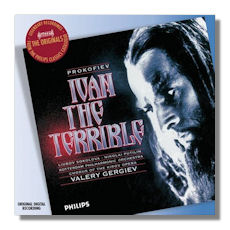
The Internet's Premier Classical Music Source
Related Links
- Prokofieff Reviews
- Latest Reviews
- More Reviews
-
By Composer
-
Collections
DVD & Blu-ray
Books
Concert Reviews
Articles/Interviews
Software
Audio
Search Amazon
Recommended Links
Site News
 CD Review
CD Review
Serge Prokofieff

Ivan the Terrible
Liubov Sokolova, mezzo-soprano
Nikolai Putilin, baritone
Chorus of the Kirov Opera
Rotterdam Philharmonic Orchestra/Valery Gergiev
Philips 4757778 64.50
Summary for the Busy Executive: Exciting, and deep – in spite of itself.
For me, Eisenstein reached his peak as a filmmaker with his massive Ivan the Terrible. However, it does seem practically overwhelmed in its own weirdness. First and foremost, the actors take on animal personae: Ivan becomes a giant bird of prey, the head opritchnik a faithful dog, the chief plotter against Ivan a reptile, and so on. Eisenstein had the good fortune to collaborate with his favorite film composer, Prokofieff, on the score. They really did collaborate, to the point where they planned to reuse the script and music for an opera on the same subject. Eisenstein's ideas were grand: three feature-length movies on the tsar. During World War II, the project (seen by the authorities as another hymn to Stalin) got full backing. Eisenstein managed to complete two parts of the trilogy. After the war, Stalin's terror once again fell upon the state, and Stalin himself resumed meddling in the arts. The third movie never got made, perhaps because it wasn't unmitigated praise. Even so, one sycophantic Soviet composer got into trouble for such a Lobgesang, when he unwittingly chose a subject about a man Stalin had killed. At any rate, the opera plans vanished along with the final part of the trilogy. Prokofieff put his score away and resolved never to write for another film.
Prokofieff had earlier achieved a breakthrough in film music with his score to Eisenstein's Alexander Nevsky, a score enormously influential internationally. You can, for example, hear echoes of Nevsky's "Battle on the Ice" in Walton's "Battle of Agincourt" for Olivier's Henry V. Prokofieff then recast the film sequences into his Alexander Nevsky cantata, one of his greatest and most enduring Soviet successes. In my opinion, Ivan the Terrible contains even better music, just as the film improves upon Nevsky. The composer integrates more strongly image and music, and the themes are both more complex and more beautiful. Indeed, the music warms the film. It grants the grotesques some modicum of humanity.
So why didn't Prokofieff do the same for Ivan? Why did he leave it in a drawer? I strongly suspect he didn't want to fight it out. He was a sick man in 1948 and after the Zhdanov decree condemning him, Shostakovich, Khachaturian, and Kabalevsky, among others, he sincerely wished to provide what the government required. Although he didn't seem to realize it, it was a mug's game. "Socialist Realism" was less an aesthetic doctrine than an excuse for political bullying, and in 1948 government officials catered to Stalin's increasing paranoia. Prokofieff in this final period (after the disastrous rejection of his opera The Story of a Real Man) concentrated on instrumental works instead. He died in 1953, ironically on the same day as Stalin.
In 1961, Alexander Stasevich took on the job Prokofieff never lived to start and arranged the film score into a Nevsky-like cantata. Nevsky concentrates its dramatic power. Ivan in comparison seems diffuse, but individual numbers to me surpass Nevsky. Nevsky, with the exception of "The Field of the Dead" aria, paints broad strokes, while Ivan deals in shades. Compare the wham-wham patriotic ending of Nevsky with the quiet tragedy of Ivan's "The Tartar Steppes." We don't know, of course, what if anything Prokofieff would have done differently than Stasevich, but in any case I'm grateful for Stasevich's labors.
I've known the piece from an old EMI recording with, I believe, Vladimir Fedoseyev conducting. A two-record set, it contained not only the music, but a speaker part. Unless you speak Russian, you won't miss it, and the remainder fits nicely on one CD. Gergiev does his usual slam-bang, but Ivan can take it (Prokofiev's symphonies can't, and I strongly recommend that you avoid Gergiev's recordings of these). To me, Gergiev is a cruder Solti, although I've loved his recordings of the lesser-known Russian operas (his Boris disappoints big-time). He seems to lose attention over long symphonic spans in favor of moment-to-moment jolts. Ivan has some of those spans, but overall it proceeds in short bursts. Consequently, it plays to Gergiev's strengths. You don't want a tasteful Ivan the Terrible anyway. The sound is ringing and clear.
Copyright © 2008, Steve Schwartz


















